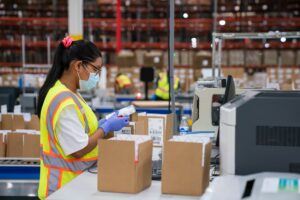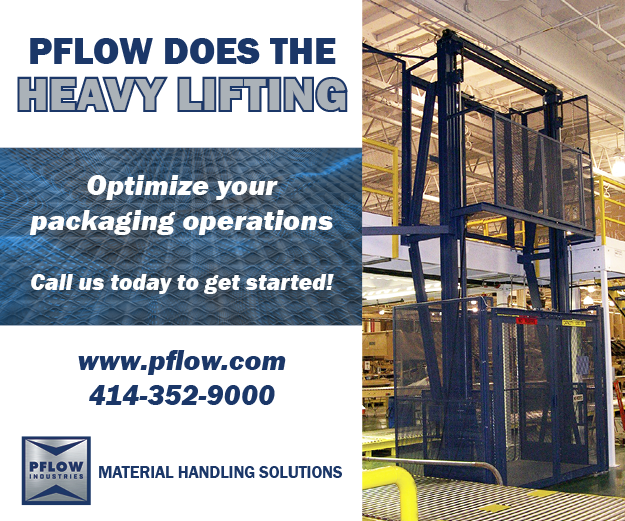Reconfiguring the Packaging Process for E-commerce
Efficient Packaging Means Less Waste and Lower Costs
By Alicemarie Geoffrion, President, Packaging Operations, DHL Supply Chain, North America

Inefficient packaging means companies are paying to wrap, ship, and store empty space. Image courtesy of DHL.
Packaging has become a strategic component of the entire supply chain, especially for many e-commerce providers who do not have the luxury of delaying orders until the next day. Meeting consumer demand for faster delivery times requires orders be filled and packaged the day they are received.
A DHL survey revealed that packaging is moving up corporate agendas across all sectors, with nine out of 10 customers expecting the relevance of packaging for their business to rise soon. Our research also found that, on average, 24% of the volume of an e-commerce package is empty space. In some e-commerce categories, this increases to 40%.
This inefficient packaging means companies are paying to wrap, ship, and store empty space. Poor package utilization translates into lower utilization of transportation assets, which drives up energy consumption and puts additional strain on network capacity. And underutilized packaging can also increase the risk of product damage in transit.
Packaging density optimization is an industry-wide challenge. The problem is difficult to solve, especially in complex and increasingly fast-moving supply chains where every shipment is different, and staff have just a few seconds to plan and execute the packing processes.
Optimizing Packaging with Data Analytics
To improve decision making and to reduce the burden placed on operational personnel, companies are increasingly leveraging data and analytics to optimize packaging processes.
Thanks to the vast degree of digital transformations and the Internet of Things, unprecedented amounts of data can be captured from various supply chain sources. This wealth of data and the insight it is providing is driving efficiencies and decision-making throughout the packaging system. One major example of this data-driven solution is with on-demand packaging solutions.
Carton optimization tools, such as the AI solution OptiCarton from DHL Supply Chain, combine sophisticated algorithms with an on-demand packaging production approach to ensure the right packaging is produced at the right time for each shipment.

The growth of e-commerce has heightened awareness of wasteful packaging among consumers. Image courtesy of DHL.
Standardized carton sizes save shipment space
They help to optimize the filling volume of boxes from an existing, pre-configured set of standard-sized cartons to maximize carton and pallet utilization at a facility. Software not only suggests the optimal size of the outer packaging, it also provides individual, visual instructions on how to arrange the contents within the box to utilize the space. The tools even suggest the splitting of an order into several boxes to make individual shipments more cost-effective and/or reduce the carbon footprint.
By running the tool periodically as demand patterns and product selections change, companies can maintain high levels of utilization while minimizing the overall complexity of their packaging systems.
According to our calculations, an optimally pre-configured and well-utilized set of corrugated boxes can save as much as 50% in superfluous shipment space. This greatly reduces the number of truckloads, allowing commercial customers to save costs not only with regard to oversized cartons and filling material, but also shipping, by eliminating unnecessary transports.
On-demand packaging solutions are efficient and eco-friendly
This type of on-demand packaging solution can deliver benefits outside of just cutting costs, increasing efficiencies and making shipments more environmentally friendly. It can help companies move away from a one-size-fits-all approach to packaging. Allowing them to gain more control, consistency and predictability with packaging while offering the flexibility needed to quickly react to changing demands and seasonal peaks and fluctuations.
Carton optimization tools, when combined with postponement and customization strategies, allow companies to make decisions and adjustments more cost-effectively at the very end of the supply chain. This is ideal for the production of popular, high-value promotions that allow retailers to design their own products and packs and support in-store promotions and brand differentiation on the shelf. It is also vital to incorporating any last-minute changes or reconfigurations that come in as the product is being stored and prepared to ship.
The growth of e-commerce has heightened awareness of wasteful packaging among consumers. An on-demand packaging solution, in combination with the optimized utilization of packing material and transport capacities, offer incredible leverage when it comes to saving costs, reducing carbon emissions, and improving the customer experience – all at the same time.
About the Author
Alicemarie Geoffrion is Vice President of Packaging Operations for DHL Supply Chain in North America, where she is responsible for growing and managing end-to-end packaging operations to drive innovations, create efficiencies, and realize savings for our customers.







